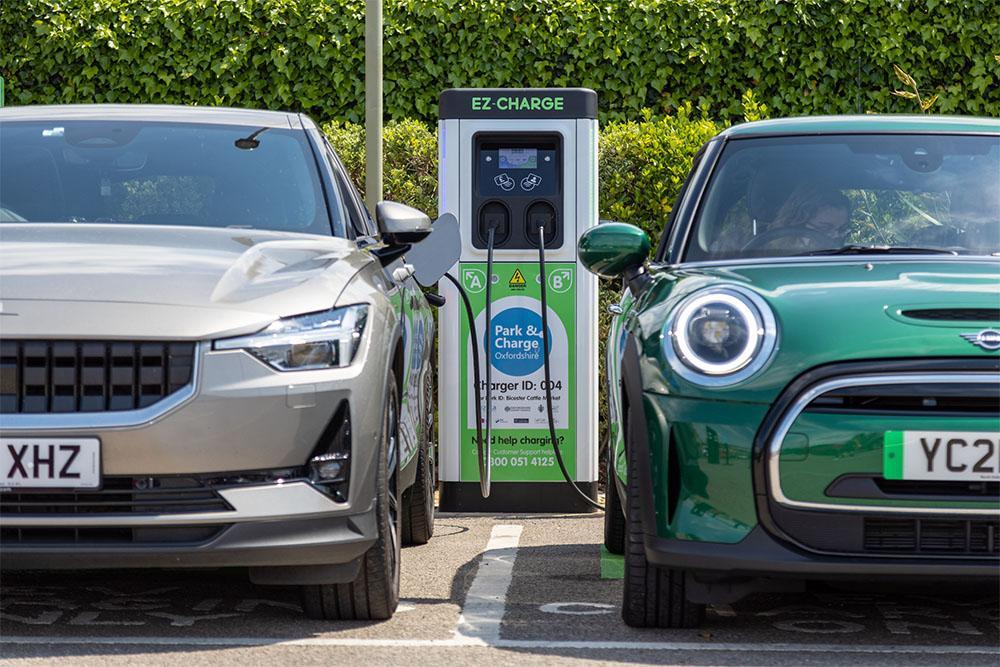EV charging for those without driveways: Oxford researchers launch guidance for policymakers

Researchers from the University of Oxford's Transport Studies Unit (TSU) and Energy and Power Group (EPG) have today released a series of briefings for policymakers to support the uptake of electric vehicles (EVs).
The transition to Electric Vehicles is well underway in the UK, with nearly 12% of new vehicle sales being battery electric last year1. The latest forecast suggests that by 2040 there will be 30 million electric vehicles on UK roads - 100 times more than there are today.
In order for the transition to continue at pace, the researchers note a number of barriers to adoption that must be overcome to get the majority of drivers to switch to EVs. These challenges include purchase cost and 'range anxiety'. But the current lack of local public charging infrastructure, particularly for those who can't charge at home, has been identified as the toughest nut to crack.
Dr Katherine Collett, Senior Postdoctoral Researcher in the Energy and Power Group at the University of Oxford, said:
At least 30% of drivers won't have access to private charging at home. As the switch to EVs gathers pace, these individuals will need to rely on public charging infrastructure to charge their vehicles. There is a clear need for local charge points, within walking distance of residents' homes, where charging slots can be booked in advance and electricity offered at an affordable price.
The researchers examined perceptions of, and preferences for, EV charging infrastructure to make the case for providing attractive alternatives to residents who cannot access private charging. A survey of 2,000 drivers from across the UK found that a pleasant and safe walk from the charging point to home was the most valued attribute for public charging infrastructure.
Dr Hannah Budnitz, Research Associate in Urban Mobility in the Transport Studies Unit at the University of Oxford, said:
Our attitudinal survey gives important insight on what matters most to people when they think about charging an electric vehicle on-street or in a car park. It is not enough to consider local capacity in terms of space and electricity. Local authorities must also consider the security and safety of the local environment, the level of parking pressure, and where people live in relation to where they can park and charge.
The researchers also conducted qualitative research, interviewing current electric vehicle drivers around Oxfordshire and those considering making the switch. to give policymakers a nuanced understanding of current EV owner behaviours as well as the preferences and barriers of hopeful soon-to-be adopters. These interviews revealed that parking routines often change when people switch to EVs, even for those with access to private off-street parking. EV owners also explained how their charging requirements led to more social interaction between neighbours and colleagues.
The following briefing notes are now available to download:
Enabling the acceleration of electric vehicle adoption
This briefing note presents the latest forecast for projected EV uptake using the now open-source tool SCATE. It also introduces the GECCO visualisation tool, which provides a practical way to identify promising car parks to host charging infrastructure, and discusses implications for policymakers and charging providers and operators.
Preferences for public electric vehicle charging
This briefing note examines the responses to a survey of 2,000 drivers in the UK. The survey looked at attitudes to electric vehicles, with a focus on charging preferences. The analysis provides insight for policymakers into the relative importance of certain charging location characteristics, including: how long it takes to walk home from the charging point; the safety and security of that journey; and the mode by which spaces can be selected or reserved.
Charging when parking - a social change of routine
This briefing note provides insights on parking and charging behaviours and perceptions of EVs among existing EV drivers and those considering the switch for their next vehicle. It presents the results of over 40 qualitative interviews conducted around Oxfordshire.
1 SMMT data
EV charging for those without driveways: Oxford researchers launch guidance for policymakers
Researchers from the University of Oxford's Transport Studies Unit (TSU) and Energy and Power Group (EPG) have today released a series of briefings for policymakers to support the uptake of electric vehicles (EVs).

